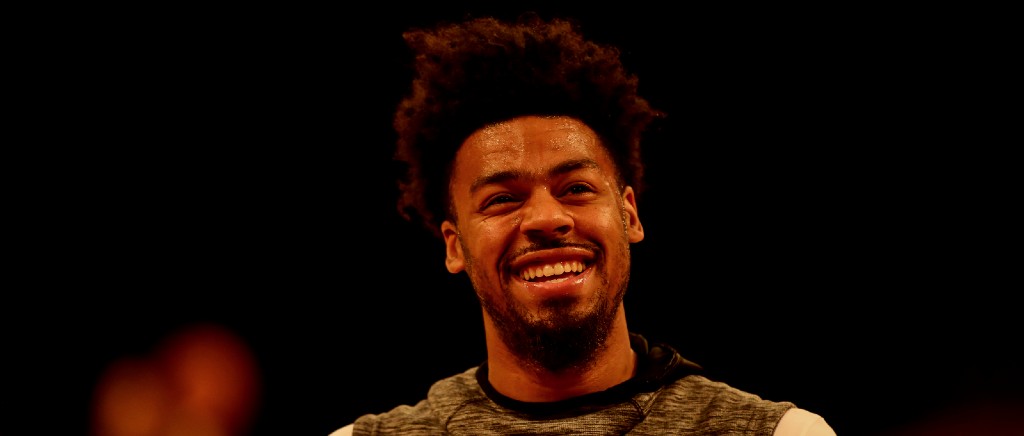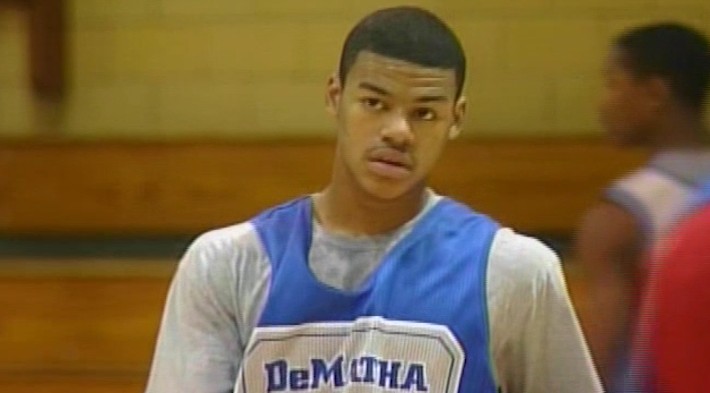
If you’ve been on social media at any point in the last month, you may have noticed that Michael Jordan is once again dominating the conversation around sports. ESPN’s 10-part docuseries, The Last Dance, has been a stark reminder about His Airness’ lasting influence on the basketball world.
It’s why, for example, when he called New York City the “Mecca of Basketball,” it was a designation treated as gospel truth. The city has proudly carried that reputation ever since. But another upcoming documentary, produced by Kevin Durant, seeks to shed light on one of America’s lesser known, but equally prolific, hoops hotbeds.
Premiering Friday, May 15 at 9 p.m. ET on Showtime, Basketball County: In the Water, takes an intimate look at Prince George’s County, the D.C. area community that has produced scores of elite players who have gone onto NBA and WNBA fame. Since 2000, more than 25 local prospects have made it to the NBA, including Durant, Victor Oladipo, Michael Beasley, Markelle Fultz, Quinn Cook, and more.
The film probes the community’s rich legacy in both sports and civil rights, which intersected with one another at various points. It was the home of Edwin B. Henderson, the civil rights pioneer known as “The Father of Black Basketball” who first introduced the game to the area and used basketball as a means of keeping youth out of trouble and as a tool for breaking down racial barriers.
P.G. County has more than 400 outdoor basketball courts and boasts some of the country’s most prolific AAU squads. The legendary prep program at DeMatha Catholic High School won five national championships over the course of Morgan Wootten’s Hall-of-Fame coaching career and has long been a pipeline for some of the country’s best up-and-coming players.
We caught up with P.G. County product Quinn Cook via telephone last week to talk about his involvement in the film and why he believes his hometown deserves more recognition. Cook told us about why it was a dream come true to win that first title with a fellow hometown native in Kevin Durant, how Go-Go music has influenced their style of play, and much more.
I had a chance to watch a rough cut of the documentary last night, and I thought it was excellent. Can you talk about how you got involved with the project?
Yeah, Rich [Kleiman] and Kevin [Durant], they had been working on it for a while. And Rich asked me to come on. I brought one of my partners, Jimmy Jenkins, on because we were kind of doing our own thing. Not as big of a platform that Kevin and Rich had and were doing it on. For them to bring us on was great. We made something special, man. We’d been working on it hard for a while. I’m excited to see how everybody enjoys it.
From your perspective, why did you feel like it was an important thing to bring more attention to PG County and how much of a tradition is there?
Honestly, it’s my home. I think it’s a great place, obviously. But I don’t think it gets the credit it deserves just from a basketball standpoint. To have so many pros and so many great players come from that small area, we’re all five minutes, 10 minutes away from each other. We all grew up together, had personal relationships with one another. The family atmosphere is something that needs to be shared with the world. And I think that it’s finally getting the light that it deserves.
I learned so much from watching it. I think they said it’s produced something like 30 NBA players since the year 2000. It’s just such a concentration of good basketball players. I was wondering, from your perspective, what sets P.G. County players apart? What sort of the style or mentality do you get from growing up and playing there?
Tough. It’s that sort of swagger and walk in our step. Because you had to believe in yourself, because you might go to the court, you might not get picked. If you lose, you might get kicked off. So, you better have that belief in yourself. And I just think that togetherness. We’re always happy for one another, we’re always…if you disrespect a guy’s game from my area, we’re going to go at you. We just have that love and respect for one another.
It seems to me like part of that toughness comes from the social and cultural history. Can you tell us a little bit about how coming out of an area like that, with such a rich and inspiring tradition in the civil rights movement, how does that influence you as a player and as a person?
Well, it’s crazy because when I watched a rough draft of documentary, there was some stuff that I learned about a lot of the historic stuff. My first camp ever growing up was going to Morgan Wootten camp. So I went to Morgan Wootten camp every year growing up until I went to high school. You have that tutelage growing up. You have all these guys who have done so many big things. Obviously, basketball is one thing, but the impact that a lot of guys from my area has done in the world, it means a lot.

You’ve been around the league for a few years now. What’s it like for you to see so many players from your hometown and to be able to compete against them at this level, and play alongside them at this level? What’s that mean to you?
Oh, it’s great because I grew up idolizing them. I grew up rooting for them, watching them, wanting them to have successful careers. When I was coming up, they always had their arm around me, always brought me up and always wanted me to be better than them. Not like them, better than them. And I always appreciated that because they never had to do that. And so growing up, watching KD and Jeff Green and all those guys, Jarrett Jack, guys that I grew up idolizing, Tywon Lawson, and getting to be pros with them, and play against them, and form relationships that are beyond basketball, it’s great.
Do you feel like you maybe play a little harder when you come up against those guys? Is there a little more trash talk going on when you’re facing them on the court?
No, it’s just never really trash talk. It’s more love, it’s more jokes, it’s more fun, really. I root with them, obviously. If this person is guarding me, it’s not like we’re going to not try to score. We’re going to be ourselves, but there’s no trash talk. There’s no, “I’m better than you. I scored more points. My team won.” We’re competitors on the floor. We’re brothers off.
You’ve won two titles with Kevin Durant, another P.G. County native. What was that experience like, the two of you knowing where you came from and how far you’d come together?
It meant the world, because we used to always talk about it growing up, and obviously our paths were different professionally, but we all had a common goal. It was about the championship. And we used to tell each other, “We’re going to win multiple championships. We’re gonna do this and that.” Not thinking we were going to do it for the Warriors or do it together, but we got it done. man. It was a beautiful, beautiful, beautiful time.
The movie really digs into that tradition of AAU basketball as well and how important that’s been for so many players. How do you look back on your time coming up in those ranks?
It was fun. It was super competitive. It was super serious. We used to work out. I’m with my coach right now as we speak. He’s in L.A. training me. But yeah, I remember our practices and those workouts. The tournaments were fun. We used to go out of town and represent D.C. and P.G. We used to take a lot of pride in that. But I remember those workouts and practices. Practicing with the older team and practicing with the pros who came back, Durant, Johnson, Jeff Green. All those guys who come back. James White. Those guys who come back and show us love. So AAU was big for us.
[Michael] Beasley mentioned something in the documentary that I wanted to ask you about. There’s a section on Go-Go music [a hybrid subgenre of funk that originated in D.C.], and he talked about how the hesitation move from some of you guys down there is a little bit different, and he likened it to the Go-Go music style. What did you think about that when you heard him talking about that?
That’s it. That’s life. That’s how we play. We play to that beat. Growing up, I know me, I didn’t really listen to rap. When we was going to work out, we’d listen to go-go. So when you’re working out, and when you’re hooping, your moves and your body, you’re moving to the beat. So that’s why we have that certain hesitation, that certain movement. I think it resembles what the music was. Mike and KD, that portion of the movie hit it right on the head.
That part was great. Do you call it the “hands-up hesi”?
It’s called the “hands up.” We definitely call it the “hands up.”
The documentary doesn’t shy away from some of the more difficult topics, specifically about Curtis Malone [Malone was a local coach and highly influential figure in the community who was sentenced to 100 months in prison in 2014 for drug trafficking. He also took Cook in after his father’s death]. Obviously it’s a complicated legacy, but he clearly did a lot of good in the community. For someone who had such a close, personal connection to him, how have you come to terms with all this over the years?
That’s still somebody that I look up to. He was like a godfather to me when I lost my dad. Curt, and my high school coach Mike Jones, stepped up to the plate and helped my mom, and myself, and my sister tremendously. He made a mistake. He owned up to it. He’s done his time, and he’s grown, and he’s continued to give back. Like I said, I had no idea that stuff was going on. So for me, just always remembering all the good that he’s done. I wouldn’t be where I am today without him.
Obviously, having the season on hold must be tremendously disappointing considering how great of a year you and the Lakers were having. What have you been doing to stay ready and stay mentally prepared, if and when the season returns?
Like I said, I have my trainer out here, my coach out here. So we’re still training as if we got to play tomorrow. Obviously, the resources aren’t what they usually are, but we improvise. That’s what we did growing up, we improvised. And for me, staying locked in, I’m always talking to my teammates. We have our group chat popping. I can’t wait to see those guys again.
What is something that people don’t know about PG County basketball players that you think we should know?
I don’t know, we just chill. We chill. We root for each other. We all can play. We’re down-to-earth guys. We don’t really care about the success that comes with the basketball, we just love to play the game. We love the feeling that we get when we play, when we hoop, and we always root for each other, we always have fun. We’re a very together group of guys.
